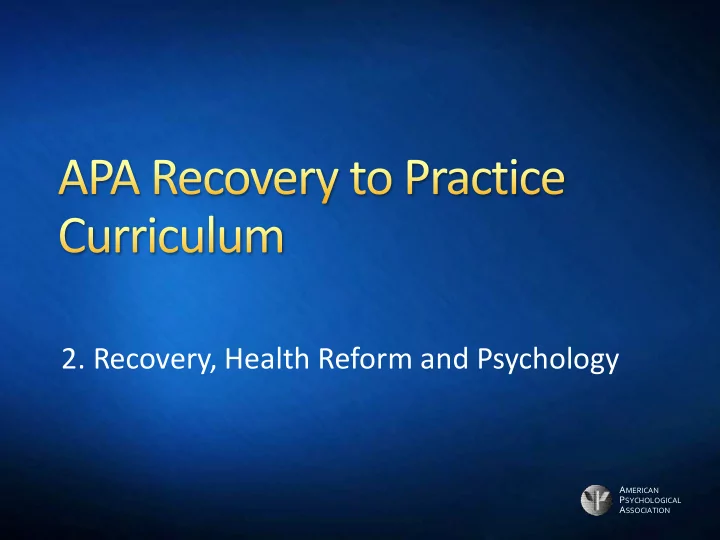

2. Recovery, Health Reform and Psychology A MERICAN P SYCHOLOGICAL A SSOCIATION
Psychologists at the Evolution of the Recovery Movement Visionaries Beginning in mid-1970s, psychologists began writing about and researching the concept of recovery from a serious mental illness Psychologists with lived experiences contributed in developing the concept of recovery Research Shows Between 46% - 75% of persons recover from a serious mental illness and successfully contribute to the community A MERICAN P SYCHOLOGICAL A SSOCIATION
Contributions Both psychologists and individuals with serious mental illnesses have worked together to: Lead efforts to conduct research on recovery outcomes Develop and test instruments to assess functional skills Develop and test rehabilitation interventions to assist the recovery process Work with State and Federal governmental agencies to promote and facilitate the recovery process A MERICAN P SYCHOLOGICAL A SSOCIATION
Traditional versus Recovery Oriented Roles of Psychologists as Clinician Researcher Program Manager Administrator / Policy Maker The roles are the same but the way psychologists function in those roles is very different! A MERICAN P SYCHOLOGICAL A SSOCIATION
Examples of Health Discrepancies for Persons with a Serious Mental Illness One in four uninsured adult Americans has a mental disorder, substance use disorder, or both (National Alliance on Mental Illness and National Council for Community Behavioral Healthcare, 2008) On average, adults with a serious mental illness die 25 years sooner than those who do not have a mental illness (National Association of State Mental Health Program Directors Medical Directors Council, 2006) A MERICAN P SYCHOLOGICAL A SSOCIATION
Examples of Health Discrepancies for Persons with a Serious Mental Illness In 2002, mental illness and substance use disorders led to $193 billion in lost productivity – more than the gross revenue of 499 of the Fortune 500 companies – and by 2013, this figure is estimated to rise to more than $300 billion (Kessler, 2008) Almost one in four stays in U.S. community hospitals involved depression, bipolar disorder, schizophrenia, and other mental health and substance use disorders (Agency for Healthcare Research and Quality, 2007) Health care reform legislation was absolutely necessary! A MERICAN P SYCHOLOGICAL A SSOCIATION
Health Care Reform: Affordable Care Act (ACA), 2010 Immediate Benefits for People with a Serious Mental Illness: • Individuals may be a part of their integrated primary care or behavioral health care team • Underinsured and uninsured populations will have access to general medical care • Access to affordable psychotherapy and psychiatric services which typically have been difficult to obtain, especially with pre-existing condition • Ability to insure children under their parents’ plans until the age of 27 • Employers can no longer deny coverage to individuals with serious mental illnesses A MERICAN P SYCHOLOGICAL A SSOCIATION
ACA and Opportunities for Psychologists Person-centered integrated treatment models that integrate psychologists into primary care, e.g., medical homes Ability to provide most appropriate interventions on time Increased use of evidence based medicine Demonstrate value of interventions through outcomes Must design, deliver, and evaluate interventions for greater public reimbursement A MERICAN P SYCHOLOGICAL A SSOCIATION
Citation for this Module: American Psychological Association & Jansen, M. A. (2014). The Recovery Movement: Role of Psychologists and Health Care Reform. Reframing Psychology for the Emerging Health Care Environment: Recovery Curriculum for People with Serious Mental Illnesses and Behavioral Health Disorders. Washington, DC: American Psychological Association. www.apa.org/pi/rtp Citation for the full Curriculum: American Psychological Association & Jansen, M. A. (2014). Reframing Psychology for the Emerging Health Care Environment: Recovery Curriculum for People with Serious Mental Illnesses and Behavioral Health Disorders. Washington, DC: American Psychological Association. mjansen@bayviewbehavioral.org or jansenm@shaw.ca August, 2014 A MERICAN P SYCHOLOGICAL A SSOCIATION
Recommend
More recommend